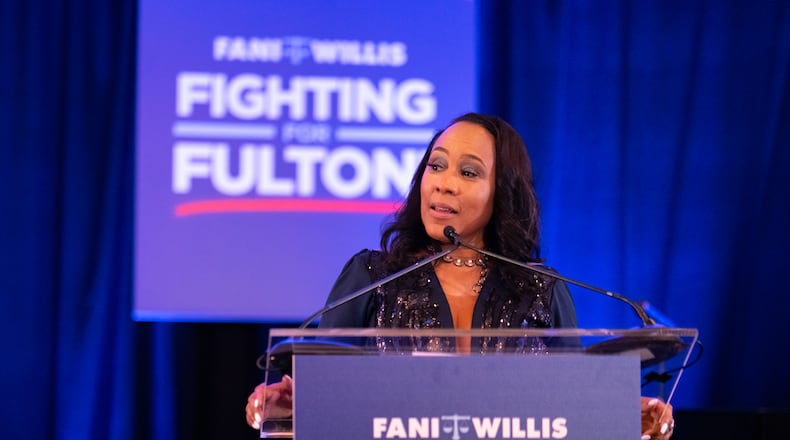The Fulton County District Attorney’s Office on Wednesday asked the state’s second highest court to dismiss an appeal seeking to disqualify Fani Willis from the election interference case against former President Donald Trump.
In a motion, prosecutor Donald Wakeford said the appeal should be rejected because it was “improvidently granted due to the lack of sufficient evidence.” Moreover, in his March 15 order allowing Willis to remain on the case, Superior Court Judge Scott McAfee made “explicit factual findings” to support his decision and which cannot be disturbed by an appellate court unless they were flatly incorrect, Wakeford wrote.
The Georgia Court of Appeals’ decision on May 8 to hear the case all but stopped court proceedings involving Trump and the eight other defendants who joined the challenge. The court cemented that by recently staying proceedings against those nine defendants.
The Willis saga began in January when a lawyer for defendant Mike Roman, a former Trump campaign official, filed a motion contending Willis and her office should be disqualified because of her romantic involvement with Nathan Wade, the special prosecutor she had appointed. Her office had paid Wade more than $700,000 in legal fees. The defense motion said Willis was benefiting financially from the case because Wade had paid for their trips to the Caribbean and Napa Valley.
Other defense motions followed saying Willis should be disqualified for giving highly prejudicial and inappropriate remarks during a church speech on Dr. Martin Luther King weekend.
McAfee determined that while Willis had a lapse in judgment and made bad decisions, her conduct did not amount to a disqualifying conflict of interest. Instead, there was the appearance of a conflict that required either Willis’ or Wade’s removal from the case. That same day, Wade withdrew.
In his motion on Wednesday, Wakeford said that after holding a multi-day hearing, McAfee, determined that evidence did not support the defense claims that Willis financially benefited from the case.
McAfee’s “frank appraisal of the district attorney’s testimony was that it withstood scrutiny” and the judge accepted her explanations that she split the costs of the vacations with Wade by reimbursing him with cash, Wakeford wrote.
The prosecutor did not mention another part of McAfee’s ruling where he said that an “odor of mendacity remains” from the hearing testimony. The judge also said there were “reasonable questions” as to whether Willis and Wade testified untruthfully.
In his motion, Wakeford argued that, at this stage, defense attorneys cannot contend there are future concerns about an appearance of impropriety because Wade has withdrawn.
McAfee also found that Willis’ remarks during her church speech were “legally improper.” But Wakeford noted that the judge found the remarks did not cross the line because Willis did not name any defendant, did not disclose confidential information and did not address the merits of the allegations to the public.
Credit: AP
Credit: AP
Because there are no grounds for the appeals court to reverse McAfee’s decision, there is no reason for the court to hear the appeal, Wakeford contended.
In a statement, Trump’s lead attorney, Steve Sadow, criticized the DA’s request calling it “a last-ditch effort to stop any appellate review of DA Willis’ misconduct.”
The issue is now pending before Judges Trenton Brown, Todd Markle and Benjamin Land, although it is possible the full court could eventually weigh in on the motion.
Also Wednesday, in an interview with CNN, Nathan Wade said defense attorneys used his romance with Willis to create distractions in the racketeering case and he denied being responsible for causing the delay.
“I don’t believe my actions played a role in it at all,” Wade told CNN’s Kaitlin Collins. Wade said he didn’t regret his relationship with Willis, who he said was still a close friend.
“I do believe, though, the timing of the personal relationship I had was probably bad,” he said.
Keep Reading
The Latest
Featured





